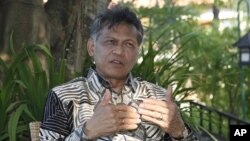President Obama and many of the world leaders attending the Asia-Pacific Economic Cooperation summit or APEC in Hawaii will travel later in the week to the East Asia Summit in Bali to continue talks on regional trade and security issues.
In an interview with VOA, Surin Pitsuwan, the Secretary-General of the Association of Southeast Asian Nations said the group’s East Asia Summit will follow up on the trade issues being discussed at APEC and include other trade-related topics in the region.
“I think APEC will be dealing with trade, trade facilitation, trade liberalization. Here, there will be issues that enable trade to flourish. So it will be stability. It will be security. It will be strategic interests of each member states,” he said.
Of the 21 members of APEC and at least 18 countries expected at the East Asia Summit, 14 nations this year are sending representative to both gatherings.
Pitsuwan says the ASEAN-led summit will focus on making the region a nuclear free zone, easing tension on the Korean peninsula, and continuing progress made toward developing a code of conduct to facilitate disputes in the South China Sea.
And he says a prominent issue on the agenda will be how to improve regional and global assistance in the wake of multiple natural disasters, such as those that severely affected Asia in the last year.
“Climate agenda is important because it somehow is affecting the region, the floods in Thailand, the tsunami in Japan, tsunami and earthquakes in Indonesia, all these things, cyclones everywhere and flooding everywhere, all these things are going to be very high on the agenda,” Pitsuwan said.
The Secretary-General says ASEAN's support for Burma to chair the organization in 2014 has become less controversial following the country’s elections last year, the release of some political prisoners, and ongoing talks between the government and pro-democracy leader Aung San Suu Kyi. Pitsuwan says because of those steps, he hopes western governments that imposed economic sanctions on Burma's military led government might announce some easing of sanctions at the East Asia summit.
“The international community as I can see, I can sense, is coming around to recognize some of the concrete steps that are being taken inside Myanmar," Pitsuwan said. "And I hope that there will be also a reciprocal gesture from the intentional community, from the big players, Japan, the U.S. the E.U. [who] are certainly watching with keen interests.”
While U.S. officials have welcomed the release of political prisoners and other pro-democratic moves, diplomats have also urged Burma’s leaders to deepen their commitment to political reforms if they want economic sanctions lifted.
Pitsuwan says as ASEAN continues to evolve into an integrated economic and political community, the East Asia Summit will grow in importance to world leaders that want to increase ties with some of the strongest economies in the world.
E. Asia Summit to Focus on Trade
- By Brian Padden





